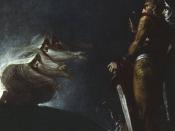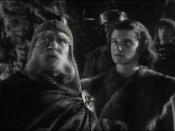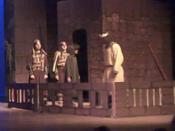Macbeth, the main character in the Shakespeare play with the same name, is a very complex and interesting character. Throughout the play Macbeth exposes his overwhelming thirst for power. Macbeth attains this power by a eliminating those who stand in his way. It is Macbeth's ever growing thirst for power that exposes him as a cruel hearted individual and ultimately causes his downfall.
At the beginning of the play, Macbeth is exposed as a coward. In the open of Act 1, Scene 7, Macbeth ponders the notion of killing King Duncan before being interrupted by his wife to whom he says, "We will proceed no further in this business / He hath honored me of late, and I have bought / Golden opinions from all sorts of people / Which would be worn now in their newest gloss / Not cast aside so soon" (1. 7. 32-35). It is at this point in the story where Macbeth has not yet had a taste of the power in which he will soon come to love.
He only pursues the notion of murdering Duncan because of the pressure he was receiving from his wife.
As the story progresses and Macbeth has attained the throne, his hunger for power grows whilst his compassion for others ultimately disappears. Macbeth becomes more fearful of others around him and the possibility of relinquishing the throne. In Act III, in the conversation between Macbeth and the, Macbeth says, "So is he [Banquo] mine; and in such bloody distance / That every minute of his being thrusts / Against my near'st of life. And though I could / With barefaced power sweep him from my sight / And bid my will avouch it, yet I must not, / For certain friends that are both his and mine, / Whose loves I may not drop, but wail his fall (3. 1. 119-129). It is at this point ion the play where Macbeth starts to show his changing heart. He is willing to betray and kill off one of his closest allies in order to maintain his seat on the throne.
In the Acts IV and V of the play, Macbeth fully evolves into the cold blooded, merciless king that he has been growing to be. Malcolm describes him as "bloody, / Luxurious, avaricious, false, deceitful, / Sudden, malicious, smacking of every sin / That has a name. (4. 3. 59-61). The once kind, gentle, and beloved Macbeth is now feared by others and trusted by no one. In the closing scenes of the play, Macbeth describes the changes he has gone through. "I have almost forgot the taste of fears./ The time has been my senses would have cooled / To hear a night-shriek, and my fell of hair / Would at a dismal treatise rouse and stir / As life were in 't. I have supped full with horrors / Direness, familiar to my slaughterous thoughts / Cannot once start me (5. 5. 9-15.). Macbeth's own self revelation about his change is the final stage in the development of his character before his ultimate downfall and demise.





